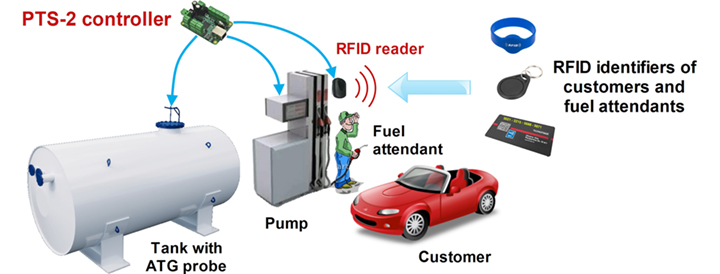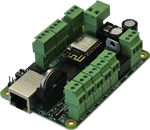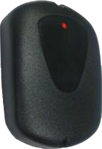Control over fuel attendants' activity for petrol stations
Traditionally on many petrol stations there are fuel attendants servicing customers. Each fuel attendant is assigned its own fuel dispenser for sales and collection of cash from customers. Before the working shift starts and after the working shift ends the manager of the petrol station checks the pump totals on the dispensers, difference of these pump totals' values equals to total volume of dispensed fuel during the working shift. The fuel attendant should return to the manager cash in amount equal to cost of total dispensed fuel volume during the working shift.
We want to describe the problems of this traditional approach and to show how automation can easily solve them and bring new possibilities and opportunities to management over the petrol station.
Traditional approach works for many years, but is subject to many problems like:
- fuel attendants should be firmly linked to specific pumps because if they start to change their working places during the day - then there can be a mess with total account of sales and return of income to the manager
- account is not automated and needs to be done manually, which always takes time and can have human mistakes
- there is no way to track productivity of the fuel attendants: how many sales were done, what is the productivity of the fuel attendant, what were the fuel attendant active working hours and when there were no sales done the fuel attendant, others
PTS-2 forecourt controller is a popular forecourt controller for automation of petrol stations. It allows to read the RFID identifiers (cards, tags, wrist straps, etc.) same time from up to 51 readers. The readers can be used as standalone, so as can be linked to pumps programmatically and mounted to pumps (example of the RFID tag to be used on the pump).
PTS-2 controller provides leading a list of tags for customers and fuel attendants, which allows to verify the customer or fuel attendant before the filling to avoid unauthorized fillings.
In the end of the filling the PTS-2 controller saves information on the performed transactions together with the read tags to the database allowing to track actions of the customer or fuel attendant and view in reports sales performed by each customer or fuel attendant.
Providing the fuel attendants with RFID tags allows to solve many important tasks including:
- Fillings can be done only by authorized fuel attendants having valid RFID tags, so it prevents a possibility to fuel by unauthorized users and thus avoid a possibility of stealing the fuel
- All the filling done by fuel attendants are saved in the PTS-2 controller database, the PTS-2 controller allows to generate reports on sales serviced by each fuel attendant, the management of the petrol station can anytime generate a report on how much cash was received by each fuel attendant during any period
- No need to manually write down totals from pumps at start and end of the working shifts - now these values are automatically recorded by the PTS-2 controller and are shown in the generated reports
- No need to fix fuel attendants for certain pumps and fueling places - now any fuel attendant can service any pump filling, the controller provides exact report information on each fuel attendant activity, which allows to save resources
- Management of petrol station can check activity of the fuel attendants and understand who is more active and who is lazy
- Any attempt to cheat or steal the fuel by the fuel attendant is automatically registered by the PTS-2 controller and shown in reports


